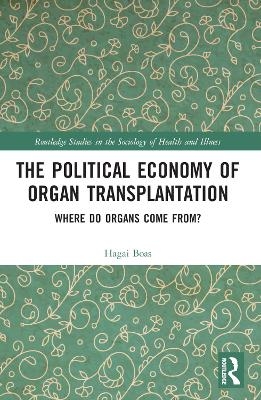
The Political Economy of Organ Transplantation
Where Do Organs Come From?
Seiten
2024
Routledge (Verlag)
978-1-032-33111-9 (ISBN)
Routledge (Verlag)
978-1-032-33111-9 (ISBN)
“This thought-provoking work examines how the relationships of organs, tissues, and cells transferred from one body to another through donation, sale, or gift are mediated by the state, market, and family. The book is a thorough review of the sociological, anthropological, and ethical literature surrounding transplant organs but encased within the author’s own personal dilemmas and lived experience. His work skillfully underscores the negotiations and accommodations inherent in the use of these technologies and reveals the situatedness of decisions that belie any simplistic readings of the ethics of transplantations… This is a stimulating and accessible book for those with an interest in transplantation, ethics, or the social implications of medical technologies. Its strength lies in the reflexive accounts from the author of his own experience juxtaposed with the sensitive appraisals of the workings of the state, market, and family in the organ economy.” Andrea Whittaker, Monash University, reviewed for Social Forces
This innovative work combines a rigorous academic analysis of the political economy of organ supply for transplantation with autobiographical narratives that illuminate the complex experience of being an organ recipient.
Organs for transplantations come from two sources: living or post-mortem organ donations. These sources set different routes of movement from one body to another. Postmortem organ donations are mainly sourced and allocated by state agencies, while living organ donations are the result of informal relations between donor and recipient. Each route traverses different social institutions, determines discrete interaction between donor and recipient, and is charged with moral meanings that can be competing and contrasting. The political economy of organs for transplants is the gamut of these routes and their interconnections, and this book suggests how such a political economy looks like: what are its features and contours, its negotiation of the roles of the state, market and the family in procuring organs for transplantations, and its ultimate moral justifications. Drawing on Boas’ personal experiences of waiting, searching and obtaining organs, each autobiographical section of the book sheds light on a different aspect of the discussed political economy of organs – post-mortem donations, parental donation, and organ market – and illustrates the experience of living with the fear of rejection and the intimidation of chronic shortage.
A Political Economy of Organ Transplantation is of interest to students and academics with an interest in bioethics, sociology of health and illness, medical anthropology, and science and technology studies.
This innovative work combines a rigorous academic analysis of the political economy of organ supply for transplantation with autobiographical narratives that illuminate the complex experience of being an organ recipient.
Organs for transplantations come from two sources: living or post-mortem organ donations. These sources set different routes of movement from one body to another. Postmortem organ donations are mainly sourced and allocated by state agencies, while living organ donations are the result of informal relations between donor and recipient. Each route traverses different social institutions, determines discrete interaction between donor and recipient, and is charged with moral meanings that can be competing and contrasting. The political economy of organs for transplants is the gamut of these routes and their interconnections, and this book suggests how such a political economy looks like: what are its features and contours, its negotiation of the roles of the state, market and the family in procuring organs for transplantations, and its ultimate moral justifications. Drawing on Boas’ personal experiences of waiting, searching and obtaining organs, each autobiographical section of the book sheds light on a different aspect of the discussed political economy of organs – post-mortem donations, parental donation, and organ market – and illustrates the experience of living with the fear of rejection and the intimidation of chronic shortage.
A Political Economy of Organ Transplantation is of interest to students and academics with an interest in bioethics, sociology of health and illness, medical anthropology, and science and technology studies.
Hagai Boas is a sociologist of health and an organ recipient. He is positioned as the director of the Science, technology and Society unit at Van Leer Jerusalem Institute and is an adjunct senior lecturer at Ben Gurion University of the Negev. His fields of interest include the sociology of transplant medicine and bioethics.
1.Exercising Shortage. 2.The making of Utopia and Dystopia in Organ Transplantations. 3.Living and Deceased Organ Economies. 4.Global Organ Economy. 5.The New Ethics of Organ Donations. 6.Contested Bioethics: The History of Organ Tranplantaions in Israel. Epilogue: When The Shortage Ends.
| Erscheinungsdatum | 17.08.2022 |
|---|---|
| Reihe/Serie | Routledge Studies in the Sociology of Health and Illness |
| Zusatzinfo | 1 Tables, black and white; 5 Line drawings, black and white; 5 Illustrations, black and white |
| Verlagsort | London |
| Sprache | englisch |
| Maße | 156 x 234 mm |
| Gewicht | 453 g |
| Themenwelt | Sachbuch/Ratgeber ► Gesundheit / Leben / Psychologie |
| Medizin / Pharmazie ► Gesundheitswesen | |
| Studium ► Querschnittsbereiche ► Prävention / Gesundheitsförderung | |
| Sozialwissenschaften ► Ethnologie | |
| Sozialwissenschaften ► Politik / Verwaltung | |
| Sozialwissenschaften ► Soziologie | |
| ISBN-10 | 1-032-33111-9 / 1032331119 |
| ISBN-13 | 978-1-032-33111-9 / 9781032331119 |
| Zustand | Neuware |
| Informationen gemäß Produktsicherheitsverordnung (GPSR) | |
| Haben Sie eine Frage zum Produkt? |
Mehr entdecken
aus dem Bereich
aus dem Bereich
das Manual zur psychologischen Gesundheitsförderung
Buch | Hardcover (2023)
Springer Berlin (Verlag)
39,99 €
Wissenschaftlich basierte Empfehlungen, Tipps und Ernährungspläne für …
Buch (2022)
Thieme (Verlag)
51,00 €


